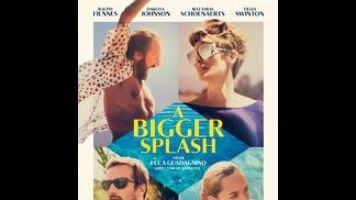It would be easy to classify Marianne Lane, Tilda Swinton’s character in A Bigger Splash, as an aging rock star. But really, that distinction comes more from the context of the movie than the actress herself. Swinton is well into her 50s, but here, as ever, she maintains a kind of ageless, alien veneer—the same otherworldy vibe that has made her a consensus choice as a David Bowie ringer. Marianne Lane isn’t a Bowie analog, exactly, though there is a glimpse of her in glittery face paint and a reference to her talent for reinvention. What little the movie reveals of her work in the recording studio feels a bit more like Lou Reed or Bob Dylan, with perhaps a touch of Patti Smith. It’s these stylistic connections, as well as a recent vocal-cord surgery that has left her unable to speak above the smallest whisper, that flag her as someone getting on in years.
Marianne arrives at her vacation home in Sicily with her lover Paul (Matthias Schoenaerts) to recuperate from her surgery, but their quiet nuzzling is interrupted when her old friend Harry (Ralph Fiennes), a music producer, drops in with Penelope (Dakota Johnson), the daughter he’s connected with only recently. Marianne regards Harry with affection, while Paul summons more of a grudging tolerance, for reasons revealed in a few concise flashbacks. Among these revelations: It was Harry who first introduced Paul to Marianne. Paul, then, seems to be wondering if he has entered into an unwanted contract that Harry can void at any time.
Harry distracts from any implied threats, or tries to, through his manic, overbearing attempts to be the life of the party, which include inviting other guests over to Marianne and Paul’s place. He also contributes to the aging-rocker atmosphere by excitedly recounting his contribution to a track off of the Rolling Stones’ late-period album Voodoo Lounge, before switching records and singing along to the title track from the Stones’ Emotional Rescue. In this scene, director Luca Guadagnino (who previously made I Am Love with Swinton) shoots Fiennes from almost every conceivable angle, which is kind of annoying—but then, so is his character’s frantic, show-off energy.
Even if Guadagnino’s direction is meant to reflect one of his characters, there’s still something overly fussy about the way his visual tics fit together—or, sometimes, don’t. There are POV shots from multiple characters, occasional sudden zooms or whip-pans that feel displaced from Scorsese (is this Vinyl: The Later Years?), and a shot that starts from an extreme close-up of Fiennes’ beard and then backs up until he’s sharing the frame with others. The stylistic curlicues are individually enjoyable, jolting the movie to attention, but sometimes they threaten to overshadow the performances.
The cast is uniformly strong, and willing to go wherever Guadagnino takes them, in however little clothing he deems necessary; the ensemble-wide equal-opportunity nudity is almost frequent enough to qualify as confrontational. As Harry and Penelope poke at the Marianne/Paul relationship in different ways, Fiennes and Johnson simultaneously play up their manipulative commonalities and their vast differences in style, befitting their status as family members who don’t know each other very well. (As Penelope points out directly, almost ominously: They don’t look much alike.) Swinton, meanwhile, conveys so much without many lines that her moments of clear enunciation in the flashbacks sound stranger than her hoarse interjections.
A Bigger Splash, which is sort of an Italian-French-English hybrid, generates such beguiling, continental tension that it’s a little disappointing when the material starts to walk the fine line between inevitability and predictability. That includes its shocks, largely duplicated from its source material, the 1969 film La Piscine. These plot turns, combined with the vaguely protracted running time that builds up to them, sometimes make the characters seem slower on the uptake than they should be. What, if anything, the movie says about rock ’n’ roll types growing old gets a little muddled. Then again, more middle-aged muddles should be this entertainingly nervy.


 Keep scrolling for more great stories from A.V. Club.
Keep scrolling for more great stories from A.V. Club.